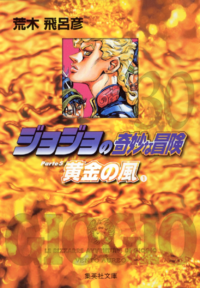Interview Archive
Hirohiko Araki's afterword, written in the first volume of the paperback edition of Vento Aureo.
Interview
Recently, I've calmed down quite a bit... or maybe I've just settled on the idea that I should go with the flow for now, since causing trouble will only tire me out. This is regarding the "self-censorship" of artistic expression within shonen manga ("Self-censorship" here refers to things like discriminatory language, racially insensitive depictions, violent scenes, abuse of the weak or animals, scenes resembling actual crimes, or immoral actions like nudity, smoking, or drinking. The editorial department decides by themselves whether these scenes are problematic and asks the artist to either omit or tone them down to avoid complaints). During the time I was writing Part 5: Vento Aureo, I, Hirohiko Araki, was internally grappling with a "raging storm" related to this issue.
Before I proceed, I want to make it clear that what I intend to write here is not a criticism of the editorial department or a commentary on "self-censorship." It's just a fact that I, Hirohiko Araki, was feeling this way while creating Vento Aureo.
With Part 5: Vento Aureo, I wanted to depict themes such as deep human grief and sorrow over one's very birth into the world, more so than I had previously in JoJo. Depending on the environment one is born into, some people find happiness from the very beginning. Then, what should those who are born into the worst situations do? The characters in Part 5: Vento Aureo are all cast out of society for one reason or another, finding themselves in situations in which the most they can do is survive. But in a world draped by evil, where the law of the jungle reigns supreme, will they be able to carry out their sense of justice?
When I try to depict a confrontation between good and evil within that theme, the influence (or should I say, the force) of "self-censorship" in shonen manga suddenly opposes the realistic expression of evil in the work. Evil smokes, shows no mercy to the weak, sexually harasses others, stabs people with knives, beheads people, rapes both women and men, plucks out eyeballs, eats brain matter, and it is assumed that even the "evil" people who don't discriminate are easily capable of doing so. If one wants to express true evil and the dark side of human nature, it is crucial that they go as far as possible to express the cruelest and most terrible aspects without hesitation.
In any case, I experienced something that had never happened to me before in my entire writing career. As soon as I started working on Part 5: Vento Aureo (which would have been around 1996), I suddenly received so many orders from the editorial department to "fix this page," "change that line," "correct this image," and so on. I'd like to go into detail about which pages they were, but there's no end to them, so I'll have to refrain. In addition, not much explanation was offered as to why they were inappropriate. Some of the requests didn't offer a clear and convincing reason at all, but they would say, "Well, in any case, it's practically a rule, and the deadline's coming up, and that's just how publishing is these days. Just hurry up and fix it. You can figure out the rest by yourself later." Again, I want to stress that I am not criticizing the editorial department in any way, nor am I implying that the editorial department was overbearing or careless (really, I always feel grateful toward my editors). I'm merely sharing my personal feelings about how I, Hirohiko Araki, perceived things while working on Vento Aureo.
And at the time, I felt a great crisis in attempting to express the themes of Vento Aureo, and I began to wonder. Had some kind of wall been set up to limit freedom of expression? Had manga itself reached the limits of its evolution? Or, perhaps ambition and profit-seeking were out to nip art in the bud? These questions had me quite distressed. Even now, I haven't found a definite answer to these questions, having, again, calmed down quite a bit. Nonetheless, my feelings at the time are naturally reflected in the personalities and actions of the protagonists.
The main characters of the work, Giorno and Bucciarati, betray the organization they belong to for the sake of their own righteousness. The organization is a symbol of power and gratitude, and acts as the "home" that raised them. And yet, the protagonists decide to fight there in order to live under justice. I found myself very encouraged by that scene, despite being the one who wrote it. I still cry when I think about how the protagonists must have felt. They could have lived safely and comfortably under the aegis of power, but instead the protagonists chose justice, no matter how dangerous it was. They believed in the value of their own existence under justice.
Despite the cool Italian fashion, unique Stand battles, and suspense depicted in Part 5: Vento Aureo, as its author I regard it as a very dark work. But even though it's a dark work, it is also a very profound work that I harbor a bit of pride in. I would be honored if you were to enjoy reading it as much as the other parts. In the afterword to Part 5's ending, I'd like to write about the things I had to remove.[Translated by HudgynS]
最近やや落ちついて、…というか、もめ事を起こしても疲れるだけだから、とりあえず従っておくかって風に定着して来たかな?という感じがする。少年漫画内の作画的表現に対する「自主規制」であるが――(「自主規制」とは、例えば、差別用語だとか差別的絵画表現⦅人種の皮膚の色の描き方⦆だとか、暴力シーンとか弱者や動物に対する虐待シーンだとか、実際の犯罪に似てるシーンだとか、不道徳的なシーン⦅裸体とか喫煙とか飲酒など⦆を編集部が自主的にマズいと思うかな?と判断して、作家に描くのをやめてもらうか、もしくは誰にも文句を言われないように表現を弱くしてもらう事)。―――この第5部 『黄金の風』を執筆期間のこの荒木飛呂彦の心の中では、実はこの問題について「大嵐」が吹き荒れていました。
これから書く事は初めに断っておきますが、編集部に対する批判だとか、「自主規制」に対する意見だとかそういう事ではなく、荒木飛呂彦は
第5部『黄金の風』になって、ぼくは以前の『ジョジョ』よりも、もっと人間の深い悲しみだとか、この世に生まれて来る事の悲しさだとかといったものをテーマに描きたくなって来ました。
人間は生まれる環境によって最初から幸せな人もいるし、もし最悪な状況の場所に生まれて来たらそういう人は、いったいどうすればいいのだろう?
第5部『黄金の風』の登場人物たちはみな、理由があって社会から外にはじき出され、そこでしか生きて行けない状況におかれてしまっています。しかし、そこは完全に弱肉強食の世界で、「悪」によって包囲されていたとしたら、彼らはその場所で「正義」を貫けるのだろうか?
そういうテーマで「善」と「悪」の対決を描こうとすると、リアリティある「悪」の表現に対し、あの少年漫画の「自主規制」の「権力」っていうのか、「暴力」っていうのかが、突然作品を攻撃して来ます。「悪」っていうのは、タバコも吸うし、弱者に対し容赦ないし、セクハラするし、ナイフで人刺すし、首はねるし、女だって男だって犯すし、目玉くり抜くし、脳ミソ食べたりするし、差別してなくても「悪」いヤツだから差別してるっていわれるし。「悪」や「人間の闇」の部分の表現には、酷い部分とか残酷な部分の表現がギリギリまでというのが不可欠になってしまいます。とにかく、今までの自分の執筆活動ではあまりなかった事なのだが、この第5部『黄金の風』に突入した途端(1996年頃)、突然編集部から「そのページ直せ」「あそこのセリフを変更しろ」「絵を修正しろ」という注文がものスゴく多くなったのだ。具体的に細かく作品のこのページのこの部分って示したいが、際限ないのでここでは省略するけど。しかもなぜダメなのかだのの説明があまりなく、中には納得いく理由があまりハッキリしていないのに、「とにかく規則みたいなものだから、〆切も近いし、そういう最近の出版状況なの。さっさと直してよ。後は自分で考えてね」的態度で指導があるのだ。もう一度断っておくけど、編集部に対する批判ではいっさいなく、編集部が、高圧的でいいかげんな態度をとっていた、とかそういうのでもいっさいなく、(実際、編集者にはいつも感謝している)当時、荒木飛呂彦は『黄金の風』を描いている時「そう感じた」という個人的感想にすぎない事を述べているだけですからね。
そしてぼくは当時、『黄金の風』のテーマ性を表現するのに大きな危機を感じ、表現の自由に限界の壁が設けられたのでは?とか、漫画としての芸術的な発展がもうないのでは?とか、「権力」とか「利益追及」の思想が芸術の芽を抜き取ろうとしているのでは?とか、とても思い悩んだ。現在も確実な答えがないまま、少し落ち着いた状態ではあるが、当時のぼくの気持ちが、当然ながら主人公たちのキャラクターとか行動にも思い入れとして表れている。
「ジョルノ」と「ブチャラティ」という主人公たちが、自分たちが所属していた「組織」を「正義の心」のために裏切る所である。「組織」は「権力」と「恩義」の象徴で、自分たちを育ててくれた「故郷」。しかし、主人公たちは「正義」の下で生きるために、そこに闘いをいどむ事を決意します。そのシーンには作者であるぽくが、描いていながら、ぼく自身がとても勇気づけられました。主人公たちの気持ちを考えると、今でも涙が出て来ます。
彼らは「権力」の庇護の下に生きていれば、安全に楽に過ごせたかもしれません。でも主人公たちは、危険でも「正義」を選択したのです。「正義の中」にこそ自分たちの存在価値を信じて。
他のパート同様、楽しんで読んでいただければ光栄に思います。『第5部終わり』のあとがきでは、「カットせざるを得なかった部分」について書きたいと思います。
